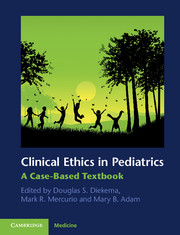Book contents
- Frontmatter
- Contents
- Contributors
- Preface
- Section 1 Core issues in clinical pediatric ethics
- Pediatric decision-making: informed consent, parental permission, and child assent
- 2 Pediatric decision-making: adolescent patients
- 3 Parental refusals of recommended medical interventions
- 4 Adolescent confidentiality
- 5 Refusals of treatment in adolescents and young adults
- 6 Family beliefs and the medical care of children
- 7 Fidelity and truthfulness in the pediatric setting: withholding information from children and adolescents
- 8 Fidelity and truthfulness: disclosure of errors
- 9 Requests for “non-therapeutic” interventions in children: male circumcision
- Section 2 Ethical issues at the beginning of life: perinatology and neonatology
- Section 3 When a child dies: ethical issues at the end of life
- Section 4 Ethical issues posed by advances in medical technology and science
- Section 5 Children, public health, and justice
- Section 6 Special topics in pediatric ethics
- Index
- References
4 - Adolescent confidentiality
from Section 1 - Core issues in clinical pediatric ethics
Published online by Cambridge University Press: 07 October 2011
- Frontmatter
- Contents
- Contributors
- Preface
- Section 1 Core issues in clinical pediatric ethics
- Pediatric decision-making: informed consent, parental permission, and child assent
- 2 Pediatric decision-making: adolescent patients
- 3 Parental refusals of recommended medical interventions
- 4 Adolescent confidentiality
- 5 Refusals of treatment in adolescents and young adults
- 6 Family beliefs and the medical care of children
- 7 Fidelity and truthfulness in the pediatric setting: withholding information from children and adolescents
- 8 Fidelity and truthfulness: disclosure of errors
- 9 Requests for “non-therapeutic” interventions in children: male circumcision
- Section 2 Ethical issues at the beginning of life: perinatology and neonatology
- Section 3 When a child dies: ethical issues at the end of life
- Section 4 Ethical issues posed by advances in medical technology and science
- Section 5 Children, public health, and justice
- Section 6 Special topics in pediatric ethics
- Index
- References
Summary
Case narrative: conflicts between confidentiality and care
Kathryn is a 16-year-old who lives with her divorced mother Stephanie. Four months ago, Kathryn was taken to the emergency department by her friend Annie, who later told Stephanie, who works full time, that Kathryn had been “like – totally bizarre,” but she didn’t know why. Kathryn was admitted in what appeared to be a psychotic state, and was treated with antipsychotic medication and sedation. At the time her mother was told by the attending clinician that her daughter was in a psychotic state, and that the cause of this was unclear.
Kathryn’s acute psychosis resolved, but she remained withdrawn and distant. She returned home following discharge from the hospital, but after 3 weeks moved out, against her mother’s strong protests, to live with two “new friends.” When she asked Kathryn what the doctor thought of this idea, Kathryn replied that the doctor thought she had returned to school. She tried to reassure her mother by saying that she would continue to see the doctor every 2 weeks. Stephanie tried to contact Kathryn’s doctor to discuss her concerns, but he indicated that he could not discuss Kathryn’s issues in detail because of his duty to respect her confidentiality. When Stephanie asked him whether he was aware that Kathryn had stopped attending school, he simply thanked her for the information.
- Type
- Chapter
- Information
- Clinical Ethics in PediatricsA Case-Based Textbook, pp. 18 - 22Publisher: Cambridge University PressPrint publication year: 2011

